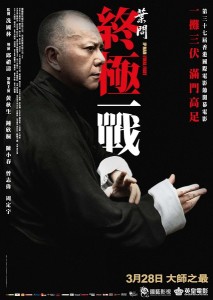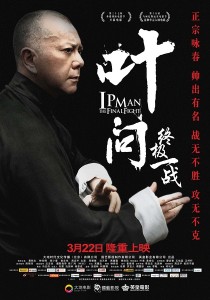Ip Man: The Final Fight
叶问 终极一战
China/Hong Kong, 2013, colour, 2.35:1, 102 mins.
Director: Qiu Litao 邱礼涛 [Herman Yau].
Rating: 7/10.
Well-mounted study of the grandmaster’s final Hong Kong years has an unfocused script.
Hong Kong, late 1949. Aged 56, Ye Wen (Huang Qiusheng) – popularly known by his Cantonese name Ip Man – arrives from his hometown of Foshan, Guangdong province, China, and stays with a friend. A grandmaster in Yong Chun [Wing Chun]-style martial arts, he starts a small school on the roof of the building, thanks to the union connections of one of his pupils, Liang Shuang (Hong Tianming). His other pupils include Chen Simei (Zhong Xintong), a dim sum waitress who loves martial arts stories; policeman Deng Xin (Chen Xiaochun); Li Qiong (Jiang Luxia), a union activist; Wang Dong (Zhou Dingyu), a prison officer; and Wang’s friend, Wu Zan (Wu Zhiyi), a tram driver. A year later, Ye Wen has to discipline some of them for getting into fights and showing off. In Nov 1950, Ye Wen’s wife, Zhang Yongcheng (Yuan Yongyi), arrives from Foshan by train. When Li Qiong is arrested during a union demonstration that turns ugly, Deng Xin manages to get her released.  Following a farewell dinner for Zhang Yongsheng, attended by Ye Wen’s old friend Li Yaohua (Liao Qizhi) and his family, Zhang Yongsheng leaves for Foshan to visit her son, who is about to attend college. Soon after she leaves Hong Kong, the border with China is closed in Jan 1951. By 1953 Ye Wen has moved to new premises. Deng Xin has become a police sergeant and is taking bribes from the underworld; though he doesn’t attend classes anymore, he still sends Ye Wen money. One evening, Ye Wen meets struggling entertainer Zhenni (Zhou Chuchu), a non-Cantonese singer of Mandarin songs, whom he saves from some ruffians from the rival White Crane School, headed by Wu Zhong (Zeng Zhiwei). Ye Wen and Wu Zhong settle their differences in a private fight, which ends in a respectful draw. Meanwhile, Deng Xin has become involved with Local Dragon (Xiong Xinxin), boss of the nefarious Walled City, helping him to fix a fight between Local Dragon’s fighter, Wei Batian (Lu Huiguang), and Wu Zhong. Ye Wen and his pupils intervene to save Wu Zhong, sealing the two masters’ friendship. When news comes in Jul 1960 that Zhang Yongcheng has died in Foshan, Ye Wen falls ill and Zhenni cares for him. Some of his pupils, including Chen Simei and Li Qiong, resent Zhenni’s close friendship with their master. Meanwhile, after marrying Chen Simei, Wang Dong leaves his low-paid prison job and starts fighting for money in the Walled City. Things come to a head between Ye Wen and Local Dragon in summer 1962, when a money fight is organised between Wang Dong and Wei Batian.
Following a farewell dinner for Zhang Yongsheng, attended by Ye Wen’s old friend Li Yaohua (Liao Qizhi) and his family, Zhang Yongsheng leaves for Foshan to visit her son, who is about to attend college. Soon after she leaves Hong Kong, the border with China is closed in Jan 1951. By 1953 Ye Wen has moved to new premises. Deng Xin has become a police sergeant and is taking bribes from the underworld; though he doesn’t attend classes anymore, he still sends Ye Wen money. One evening, Ye Wen meets struggling entertainer Zhenni (Zhou Chuchu), a non-Cantonese singer of Mandarin songs, whom he saves from some ruffians from the rival White Crane School, headed by Wu Zhong (Zeng Zhiwei). Ye Wen and Wu Zhong settle their differences in a private fight, which ends in a respectful draw. Meanwhile, Deng Xin has become involved with Local Dragon (Xiong Xinxin), boss of the nefarious Walled City, helping him to fix a fight between Local Dragon’s fighter, Wei Batian (Lu Huiguang), and Wu Zhong. Ye Wen and his pupils intervene to save Wu Zhong, sealing the two masters’ friendship. When news comes in Jul 1960 that Zhang Yongcheng has died in Foshan, Ye Wen falls ill and Zhenni cares for him. Some of his pupils, including Chen Simei and Li Qiong, resent Zhenni’s close friendship with their master. Meanwhile, after marrying Chen Simei, Wang Dong leaves his low-paid prison job and starts fighting for money in the Walled City. Things come to a head between Ye Wen and Local Dragon in summer 1962, when a money fight is organised between Wang Dong and Wei Batian.
REVIEW
Five years on from Ip Man 叶问 (2008), and hot on the heels of the artier one-off by Wang Jiawei 王家卫 [Wong Kar-wai], The Grandmaster 一代宗师, Ip Man-ia continues apace with this second in an “alternative” series (i.e. not starring Zhen Zidan 甄子丹 [Donnie Yen] and not made by Ye Weixin 叶伟信 [Wilson Yip]). Directed by Hong Kong’s Qiu Litao 邱礼涛 [Herman Yau] and produced by Yong Chun [Wing Chun] pupil Xian Guolin 冼国林 via his China-based National Arts Films Production, Ip Man: The Final Fight 叶问 终极一战 is a much mellower movie than their first collaboration, The Legend Is Born: Ip Man 叶问前传 (2010), and conspicuously lacks its vervy, action-ful energy.
Part of that is due to the story setting: the film could easily be called Ip Man: The Final Hong Kong Years. But part is also due to the title casting of veteran actor Huang Qiusheng 黄秋生 [Anthony Wong]. Though not an obvious choice for playing the late martial arts grandmaster, Huang acquits himself okay in his relatively few action scenes, thanks to skilful staging and cutting. Most of all, however, he brings a mature feel to the film that makes it more about character than fighting, more about one proud man’s journey through the final two decades of his life in the “foreign” territory of Hong Kong than a purely genre movie of rival schools and techniques or a martial artist needing to prove himself on a professional level.
A sense of nostalgia for 1950s/1960s Hong Kong is palpable throughout the whole movie, starting with a technically impressive opening as the camera swoops down into the streets of Kowloon, morphing from CGI to real people. In that respect The Final Fight consciously plays into the continuing retro wave in Hong Kong cinema, an elegy for a simpler time when the territory had a unique identity. On a production and costume design level, the film has a similar look to Ip Man 2, not purely natural but without overdoing the retro look. However, where it differs from that movie is in its lack of nationalism, with no Chinese vs foreigner subplot. The “final fight” of the title is simply between Ye Wen, aka Ip Man, and a local Walled City gangster.
Starting in 1949, when Ye Wen arrives in Hong Kong from Foshan, China, the film follows him through the 1950s as he establishes a Yong Chun school and ends in the early 1970s as he re-meets one of his pupils (an unnamed, only vaguely glimpsed “international film star”, i.e. Li Xiaolong 李小龙 [Bruce Lee]) who has returned to Hong Kong from the US. The final scenes are interesting for (a) showing Ye Wen’s evident disapproval of the star’s career and (b) showing a few seconds of the sole surviving footage of an aged Ye Wen practising his moves at home. Apart from that, the film vaguely follows the same plot trajectory as Ip Man 2, with the veteran grandmaster setting up a school, disciplining his students, and so on.
Aside from Huang in the title role, Qiu has assembled a quirky cast as his pupils. Twins singer Zhong Xintong 钟欣潼 [Gillian Chung] is more convincing as a dim sum waitress who likes martial arts atories than as a student of Yong Chun, while Mainland action tomboy Jiang Luxia 蒋璐霞 (Bad Blood 灭门, 2010; Vampire Warriors 僵尸新战士, 2010) is hardly recognisable as a union activist in a severe 1950s hairdo and gets almost no chance to show off her genuine skills. As a pupil-turned-corrupt-cop, Chen Xiaochun 陈小春 [Jordan Chan] is OK but similarly thinly drawn in the rather bitty screenplay by Li Min 李敏 [Erica Li] which leaps around here and there without really creating an emotional arc for the film. The strongest, most affecting relationship is not between Ye Wen and any of his pupils but between him and a non-Hong Kong singer, touchingly played by Mainland actress Zhou Chuchu 周楚楚 – who had dual roles in Qiu’s Nightmare 青魔 (2012) – in heavy 1950s/1960s make-up and hair-do. Even that relationship, however, is never fully developed into a strong dramatic line.
The result is a movie that is interesting rather than dramatically involving, and mellow rather than truly elegaic. Though definitely at the quality end of the prolific Qiu’s broad spectrum, it could have been much more with a screenplay that acknowledged its different focus from The Legend Is Born and stayed on course as a character study. As in the previous movie, Ye Wen’s real-life son, Ye Zhun 叶准 [Ip Chun], makes a cameo appearance, here as a street seller below Ye Wen’s flat.
CREDITS
Presented by National Arts Films Production (CN), Emperor Film Production (HK), Dadi Century Film (Beijing) (CN). Produced by National Arts Films Production (CN).
Script: Li Min [Erica Li]. Original story: Xian Guolin. Photography: Chen Guanghong [Joe Chan]. Editing: Zhong Weizhao [Azrael Chung]. Music: Mai Zhenhong [Brother Hung]. Art direction: Chen Jinhe [Raymond Chan]. Costume design: Zhuang Zhiliang [Thomas Chong]. Action: Li Zhongzhi [Nicky Li], Xian Guolin. Wing Chun consultation: Zhou Dingyu, Ouyang Zicong. White Crane consultation: Lu Songmao, Lu Quansheng, Yao Jiangang.
Cast: Huang Qiusheng [Anthony Wong] (Ye Wen, grandmaster), Zhong Xintong [Gillian Chung] (Chen Simei, dim sum girl), Chen Xiaochun [Jordan Chan] (Deng Xin, policeman), Zhou Dingyu (Wang Dong, prison officer), Zeng Zhiwei [Eric Tsang] (Wu Zhong, head of White Crane School), Zhou Chuchu (Zhenni/Jenny, the singer), Hong Tianming (Liang Shuang), Jiang Luxia (Li Qiong, union girl), Xiong Xinxin (Local Dragon, head of Walled City), Wu Zhiyi (Wu Zan), Ye Zhun [Ip Chun] (stall owner with phone), Yuan Yongyi [Anita Yuen] (Zhang Yongcheng, Ye Wen’s wife), Liao Qizhi [Liu Kai-chi] (Li Yaohua, Ye Wen’s old Foshan friend), Wang Zulan (Blind Chen), Wang Zixuan (Ni Tong), Lu Huiguang [Ken Lo] (Wei Batian, Local Dragon’s fighter), Xu Huangli (Li Yaohua’s second daughter), Zheng Jiaying (young Ye Wen), Luo Guanlan [May Law] (Li Yaohua’s wife).
Premiere: Hong Kong Film Festival (Opening Film), 17 Mar 2013.
Release: China, 22 Mar 2013; Hong Kong, 28 Mar 2013.
(Review originally published on Film Business Asia, 18 Mar 2013.)
